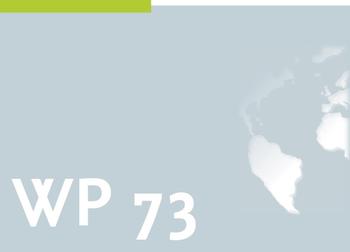International Organizations' Modes of Governance in Areas of Limited Statehood: The Case of Food Security
Leon Valentin Schettler, Angela Heucher, Andrea Liese
Internationale Organisationen (IOs) stehen vor einer doppelten Herausforderung in Räumen begrenzter Staatlichkeit (RbS): Einerseits sind IOs qua Mandat Regierungs-Organisationen. Ihre übliche Vorgehensweise – ihren Mitgliedern bestimmte Dienstleistungen bereitzustellen und mit oder für einen Staat zu arbeiten – kann in RbS jedoch nicht umsetzbar oder nicht nachhaltig sein. Andererseits gehen RbS mit zahlreichen Herausforderungen für die Governance-Aktivitäten von IOs einher, wie einer beeinträchtigten Sicherheitslage oder fehlender Meta-Governance. Nichtsdestotrotz wissen wir wenig darüber, wie IOs in solchen Kontexten operieren und welche Governance-Modi sie für welche Zwecke wählen. Wie können IOs im Einklang mit ihrem regierungsfokussierten Mandat operieren und dabei gleichzeitig auf RbS-spezifische Herausforderungen reagieren, um Ernährungssicherheit effektiv bereitzustellen? In diesem Working Paper analysieren wir, wie verschiedene IO-Typen angesichts RbS-spezifischer Herausforderungen diverse Governance-Modi (von bargaining bis persuasion) wählen und kombinieren. Unsere Analyse beruht dabei auf Interviews, die wir an den Hauptsitzen mehrerer IOs (ECHO, FAO, IDB, WFP und Weltbank) und in ausgewählten Länderbüros (in Côte d’Ivoire, Haiti, Kolumbien, Niger und Sierra Leone) durchgeführt haben, sowie auf organisationalen Dokumenten.
International organizations (IOs) are confronted with a twin challenge in areas of limited statehood (ALS). On the one hand, IOs are governmental organizations qua mandate. Their usual approach – providing a range of services to their members and working with or for a given state – may, however, either be blocked or prove unsustainable in ALS. On the other, ALS present numerous challenges to IO governance, ranging from insecurity to a lack of meta-governance. Yet, we know surprisingly little about how IOs operate in these contexts, and, in particular, which modes of governance they choose for which purposes. How can IOs attain the twin objectives of acting in accordance with their mandate, which gives primacy to governments, and responding to ALS-specific challenges in order to effectively provide food security? This paper addresses IOs’ choice of distinct modes of governance, ranging from bargaining to persuasion. It investigates how different types of IOs use and combine these modes in light of varying ALS-challenges. The empirical observations presented in this paper stem from interviews with IOs (ECHO, FAO, IDB, WFP, and the World Bank) at the level of headquarters and country offices (in Colombia, Côte d’Ivoire, Haiti, Niger, and Sierra Leone), as well as from organizational documents.

